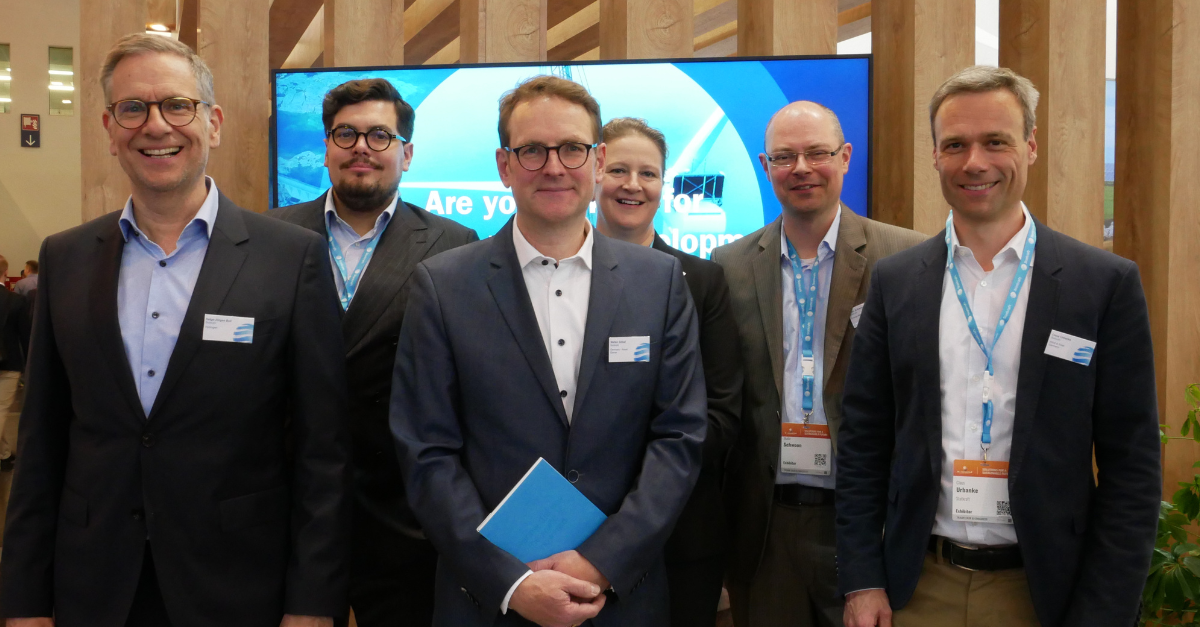Targets for Germany: Statkraft grows with green hydrogen, wind and solar power
Düsseldorf/Essen, 24 May 2023. Statkraft, Europe's largest producer of renewable energy, is on a growth path. At this year's E-world energy & water in Essen, the Norwegian energy company announced its expansion targets for the German market. Statkraft will be instrumental in increasing the share of renewable energy in Germany by 2030 and supporting the market ramp-up of green hydrogen.
- Green hydrogen: 250 MW installed capacity by 2030.
- Wind and solar parks: 300 to 500 MW installed capacity per year from 2027.
- We will become the industry's leading partner for green energy solutions.
"Statkraft offers green energy solutions along the entire value chain. Our strong financial position is crucial on the way to becoming one of the global leaders in renewable energy," said Stefan-Jörg Göbel, Statkraft Country Manager in Germany. "Statkraft’s ambition is to become a leading global renewable energy producer, building 2500-3000 MW per year, equivalent to one new power plant every ninth day from 2025."

He added that the company will also contribute to the success of the energy transition in Germany as a developer of energy projects, operator of renewable energy plants, provider of market access of renewable energy for its own and third-party plants, and as an industry partner for sustainable solutions.
2,000 MW of wind and solar by 2030 in Germany
Against the backdrop of the ongoing energy crisis in Europe and advancing climate change, Statkraft believes it is strategically well positioned to play a key role in shaping the necessary transformation of the German energy system. "Germany is facing the major challenge of massively accelerating the expansion of renewable energy - in order to achieve the climate targets and create a faster phase-out of fossil fuels. We can confront this challenge with very concrete solutions," says Göbel. "We are building an organisation that will be able to develop and build around 300 to 500 MW of wind and solar capacity in Germany every year from 2027."
By 2030, the company plans to operate an installed capacity of 2,000 MW of wind and solar plants. Together with its existing flexible power plant portfolio in the order of 1,800 MW and its leading position as a provider of energy solutions, Statkraft is ideally positioned to deliver on the energy transition.
The company announced its market entry as a developer in Germany only in 2019.
Top 10 green hydrogen producers in Germany
Statkraft aims to become a leading supplier of green hydrogen in selected Statkraft markets in Europe. In Germany, the company plans to have at least 250 MW of installed electrolysis capacity operational in 2030. As recently as April, Statkraft announced plans for a 10 MW pilot project at the existing power plant site in Emden, which is expected to be operational in 2025, provided the necessary permits and funding are in place. The aim is to operate electrolysers in Emden to produce green hydrogen with a total capacity of up to 200 MW connected to the future hydrogen pipeline network by 2030. Other German power plant sites are currently being examined for their potential to produce green hydrogen.
"The use of existing infrastructure for the production of green hydrogen is crucial for economic and ecological reasons," explains Stefan-Jörg Göbel. The green hydrogen is to be used in the first step to decarbonise the regional transport sector in East Frisia. "If we can connect electrolysers to the pipeline network in the second step, we will also be able to supply industrial companies nationwide with green hydrogen on a large scale," says Göbel.
Decarbonisation with green energy solutions
Statkraft is consistently expanding its role as a bridge builder between the different needs of renewable energy producers and consumers. By concluding numerous power purchase agreements, the company has enabled the financing and operation of around 1,000 MW of subsidy-free renewable capacity in Germany over the past two years. On the consumer side, the company has at the same time developed as an industry partner for large commercial and industrial consumers who want to achieve sustainability and climate goals as well as price hedging in times of high electricity prices.
With the market ramp-up of hydrogen, the Norwegian marketing specialist will be able to further decarbonise industrial companies by selling green power to producers of green hydrogen, but also by offering them solutions for optimised market access of hydrogen.
Necessary political course setting in Germany
Statkraft welcomes the numerous improvements in the German Renewable Energy Act (EEG) and the associated laws, such as the simplification of the approval procedures for solar and wind projects in Germany. In the company's opinion, these will make it possible to overcome the stagnating expansion of renewable energies. However, the company sees a need for improvement in the future subsidy and financing of the expansion of renewable energies. "The amendment of the Renewable Energy Act sets important accents for a successful energy transition. However, it is of central importance that a coexistence of CfDs and PPAs will be possible when the support scheme is changed. It should not become mandatory to conclude a CfD," says Sascha Schröder, Vice President Central European Origination.
There is concern that the introduction of a contract-for-difference support system in Germany will slow down the developing power purchase agreement market and bring the forward market to a standstill. This should be avoided. In addition to the aspect of CO2 reduction, PPAs are an important instrument for industrial companies for a predictable and long-term hedge against rising or highly fluctuating electricity prices.
Press Contact

Statkraft in Germany, Markets